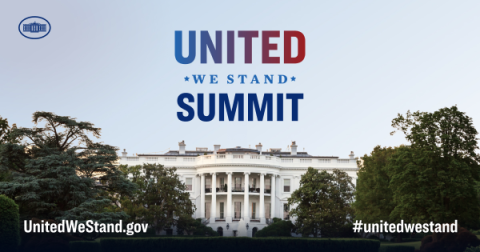Hate must have no safe harbor in America—especially when that hate fuels the kind of violence we’ve seen from Oak Creek to Pittsburgh, from El Paso to Poway, and from Atlanta to Buffalo. When ordinary Americans cannot participate in the basic activities of everyday life—such as shopping at the grocery store or praying at their house of worship—without the fear of being targeted and killed for who they are, our security as well as democracy are at risk.
The arts and humanities help us develop the skills needed to find connection, common purpose, and recognition of our shared humanity. The NEA recognizes the role of the arts in preventing radicalization by building empathy and strengthening mutual understanding, providing solace in the direct aftermath of incidents of hate-motivated violence, and building community resilience and recovery. Through its United We Stand response, the NEA looks forward to supporting arts organizations that advance these themes and collaborating with the National Endowment for the Humanities on a nationwide response. This work will build on the NEA’s ongoing engagement with states, regions, and local communities, highlighting and strengthening the role of the arts in the nation’s civic infrastructure, the norms and agreements that we rely on to care for one another.
About the United We Stand Summit

In September 2022, President Biden hosted the United We Stand Summit at the White House to counter the destructive effects of hate-fueled violence on our democracy and public safety, mobilize diverse sectors of society and communities across the country to these dangers, and put forward a shared, inclusive, bipartisan vision for a more united America.
Americans of all backgrounds, beliefs, and political affiliations remain overwhelmingly united in their opposition to hate-fueled violence. The United We Stand Summit brought together uniters from across America who are leading work in their communities to build bridges and address hate and division, including survivors of hate-fueled violence.
NEA Chair Maria Rosario Jackson, PhD and NEH Chair Shelly C. Lowe (Navajo) participated in the summit, which included bipartisan federal, state, and local officials, civil rights groups, faith and community leaders, technology and business leaders, law enforcement officials, former members of violent extremist groups who now work to prevent violence, gun violence prevention leaders, media representatives, and cultural figures. The summit featured a national address from President Biden as well as bipartisan panels and conversations on countering hate-fueled violence, preventing mobilization to violence, and fostering unity. NEH Chair Lowe spoke on behalf of the NEH and NEA as part of the panel Federal Initiatives to Address Hate-Fueled Violence (2:27:45) where she noted NEA and NEH’s plans for future collaboration to address these issues. Read more about these efforts in the United We Stand fact sheet.
Watch the full summit:
“The arts and humanities have always been an avenue for acknowledging and expressing pain, coming to terms with that pain, and building support networks for survivors. In moments of loss and tragedy, we come to together to both create and turn to art, poetry, music, literature for solace and healing. And to the lessons of history for understanding, and to religion and philosophy for acceptance. Combating hate not only requires us to identify the root causes of that hate but also to identify our inherent capacity for love, acceptance, empathy, and belonging.”
–NEH Chair Shelly C. Lowe
Stories from the Arts Community:
- Sacred Ground: A Commissioning Project to Commemorate the Tulsa Race Massacre
- De-invisibilizing: Wideman Davis Dance Gives Voice to Enslaved Blacks with "Migratuse Ataraxia"
- Joy Is a Beautiful Act of Resistance: Multidisciplinary Artist Amanda Phingbodhipakkiya
- The Making of Lost Freedom: A Memory: Actor/Author George Takei and Composer/Musician Kenji Bunch
- Arts as a Healing Element: Tash Terry (Diné [Navajo])/Elena Higgins (Maori/Samoan) of IndigenousWays
- Telling American History through A Native Lens: A Talk with Educator Chris Newell (Passamaquoddy)
- Dancing Outside the Box: Vanessa Sanchez y La Mezcla
- Telling Our Stories: Rebecca Medrano of GALA Hispanic Theatre
Past Projects Supported by NEH:
- Partnership with Humanities Texas and the El Progreso Memorial Library in Uvalde, Texas, to establish an archive to support the Uvalde community in the wake of the Robb Elementary School shooting in May 2022
- Support for the Council of American Jewish Museums (CAJM) to conduct security preparedness for terrorist acts against Jewish museums
- Morningside: A Survivor’s Story of the Greensboro Massacre
- Emanuel AME Church in Charleston, South Carolina: 200 Years of African-American Life
- Notoriously Toxic: Understanding the Language and Costs of Hate and Harassment in Online Games
- Documents of Yiddish Life
- The 1921 Tulsa Massacre
- Writing Gay History
- Echoes of History: Mistreatment and Incarceration in the American West NEH Landmarks of American History and Culture Workshop at Heart Mountain
- Excerpt from Tiya Miles’ NEH-supported book All That She Carried: The Journey of Ashley’s Sack, a Black Family Keepsake


